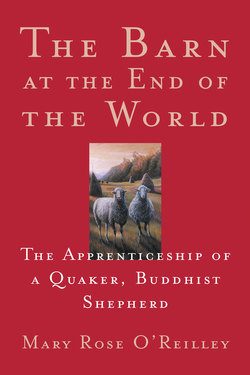Читать книгу The Barn at the End of the World - Mary Rose O'Reilley - Страница 29
На сайте Литреса книга снята с продажи.
ОглавлениеChaos
TODAY THE BARN WAS in chaos when I got there at eight-fifteen. Half the pens had been cleaned out and all the west side sheep were on the east side, a number of wethers were missing, and some odd faces peered out here and there. Butthead, in his fancy Sam Browne belt, had been put in with the ewes and was looking unusually pleased with himself. The ram’s belt, or mating harness, contains an oily red chalk, called raddle, which marks the ewes when he mounts them. This ancient system helps us keep track of the revels and predict our lambing schedule—it’s hard to tell when sheep are pregnant because most of the lamb’s growth occurs in the last three months. I could see that our happy Butthead had done his duty by these raddled ewes.
One of the vasectomized rams, by contrast, was in ill humor and kept trying to get behind me as I crossed the pasture to check water. I would be walking sturdily along, then sense an air current behind me. As soon as I turned, the ram would stop and look as innocent as any politician. Then I’d walk ahead and he’d charge.
This morning, it was taking me forever to mix feed, because I was not sure of what the plan was. Giving out the wrong feed is no small mistake when we’re fattening lambs for market, drying up ewes, etc.
Finally around nine-thirty Ben came in, madder than hops from a meeting with the auditors. They want the barn to become financially self-sustaining, despite the fact that Ben’s superb management has retired a colossal debt from earlier years. “Where does the money go?” Ben wants to know.
“Lots of administrators sitting around playing with themselves,” I confide. It’s rare that I know something he doesn’t know. “They have meetings and devise projects that they then need to have more meetings to talk about, though most of the projects are unnecessary, destructive, and show no common sense.”
Ben gives a disheartened snicker. Ben is a real person doing real things, at the mercy of unreal people doing unreal things.
It reminds me of teaching, a job I used to do long ago.
Later we played an elaborate game of “Run, Sheep, Run” all over the pastures, rounding up a bunch of ewes we are getting ready to breed. They have to be dewormed, inoculated, and fed with “weigh back”—a mixture of corn, silage, hay, soybeans, and nutritional supplements we get from the dairy barn after it has been processed through the cow stalls. The idea is to get the ewes into the best possible condition for bearing their young. Luring them in from the pasture was half the battle, since they were perfectly happy to remain there. Inside, penning thirty Hampshire ewes meant repenning a number of other sheep, none of them in favor of our plan. In the process, half the outdoor sheep had jumped the inside fence following their friend the vasectomized ram. Vasectomized rams are put in with the ewes in order to make them start cycling, then removed (to their chagrin) when the breeding ram (e.g., Butthead) goes in to do his work. You can imagine what the vasectomized ram thinks about this and how it affects his temper. His is one of those weird karmas; it’s like being a eunuch in a harem.
When Ben calls the sheep, he croons to them with the same call I’ve heard Yorkshire farmers use: “Com’la’, Com’la’.”
He instructs me on the nuances of sheep language. “Don’t say ‘go!’ to them,” he chides. “They don’t know that word. They know Hai! They know OK! They know Hai-up, you goddam sonsa bitches!”
“I see.”
“Those words are for driving before. Com’la’ is for calling in.”
Animal songs, like lullabies and clapping rhymes, must be among the oldest sounds in the language. Every man must invent his own love-talk but speaks a common dialect to his animals: “Co’boss! Sooey!” These words, a linguist once told me, can be traced back to the time of Beowulf.
After we penned the ewes, we drenched them with vermifuge and shot them up with anti-overeating medicine. Without this medicine, sheep, if they happen to get their noses into some illegitimate corn, will eat themselves to death. Hand under the muzzle again for control, shoot, drench, mark with orange chalk. Bye for now, she’s jumped the outer fence and headed back for the pasture. “Don’t shoot too near the spinal cord,” Ben cautions, “or I’ll make you take her home in a wheelchair.”
I’m never happier than when biting off the cap of a syringe and giving shots or performing some minor surgery, simply because I’m competent at it. I suppose this is why doctors get into trouble performing unnecessary procedures: the good of the patient can be overshadowed by the pleasures of craft.
